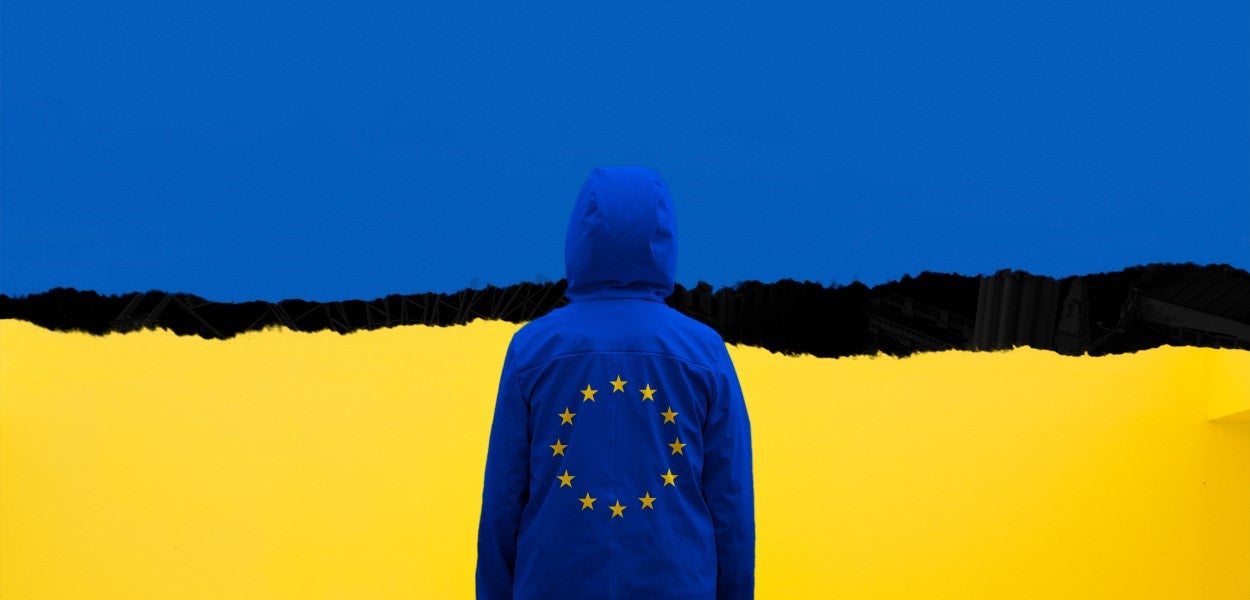“We had to act quickly when the call from the EU was published,” says Els van der Ven, explaining how the project started. “Our immediate intention was to set up an initiative to help Ukrainian refugees on a large scale with mental health support.” The focus lies on countries neighbouring Ukraine: Slovakia, Romania and Poland, which are now home to many Ukrainians. “There is a large gap between the need for mental healthcare and the number of service providers available in these countries,” continues Els van der Ven. They started contacting NGOs in these countries to find collaborative partners. “In the end, we found three partners from the focus countries who agreed to implement evidence-based psychological interventions.”
Digital first aid
Iryna Frankova talks about the development of a chatbot that became available just two days after the war broke out. “Our technical partner had already written the code which was ready for use. Together with my PhD student, we developed a script that culturally and contextually fit the situation in Ukraine and the ongoing pressure of the war. Since it was already the subject of the PhD project, we just needed some time to make it work.” And it did. Around 80,000 Ukrainians are now using the chatbot. The scientists at VU Amsterdam and partners have worked hard to organise and coordinate psychological interventions developed by the World Health Organization (WHO), proven to be effective to be available for Ukrainians in a short period of time. Iryna Frankova has been closely involved in this initiative from day one she joined the team of the Clinical, Neuro- and Developmental Psychology at the university in April.
The digital interventions are based on evidence-based psychological interventions such as Psychological First Aid, says Els van der Ven. “They’re suitable for people who experience acute stress.” Iryna Frankova adds: “It consists of things like muscle exercises and breathing techniques. In the app, you can find recordings that have been translated into Ukrainian and used for mindfulness and meditation practices. They’re very important because they’re easily accessible and have a large reach. You can download them and get started straight away. But apart from psychological first aid, more people also suffer from recurrent feelings of depression and anxiety. In such cases, these interventions may not be enough. That’s why face-to-face therapy is also important. And the focus of U-RISE is to offer both.”
Training and educating
Targeted face-to-face psychological interventions in countries where this service cannot always be provided seems like a major challenge. Thanks to the collaboration with NGOs in Eastern Europe and to the training made available for Ukrainian mental health professionals displaced there, this type of psychosocial support will be provided. “We train Ukrainian forcibly displaced persons to become aid workers. They don’t necessarily need to have a medical background, but they want to provide social and psychological support to other refugees,” says Iryna Frankova. “The aim is to train as many of these care providers as possible so that they can offer the various types of support.” Els van der Ven adds: “We want to be able to offer different levels of psychological care that can be tailored to the specific need: tools for self-help, group trainings and one-on-one conversations. We’ve also added a family dimension, because we see a need for this in the Ukrainian context. Men fighting in the army results in separated families. This causes stress and problems.”
Working together and learning from each other
Els van der Ven emphasises the importance of Ukrainian representation in the project. “A lot of Ukrainians are working on this project. It’s not about a university in Amsterdam telling people what to do over there. We want to make it interactive and learn from each other. We need Ukrainian expertise to build the interventions and think about the different activities.” Iryna Frankova identifies the language barrier as an important issue when it comes to psychological care for refugees. “One of the main goals of the project is to create a network of Ukrainian- and Russian-speaking professionals who can provide training and who we can assist in carrying out the interventions. That’s one way we can reduce stigmas and break the language barrier.” In addition, there’s a real need for interventions that’s focused on the Ukrainian context specifically, says Iryna Frankova. “For example, what I hear from other Ukrainians who read our translations is that they really want to see the context of their specific situation in the materials – in other words, that the war is actually mentioned. That way, they feel heard.”
Proud to participate
Iryna Frankova, who herself also fled Ukraine last year, says she’s moved by how involved and interested people are. “I feel proud to be part of this project. So many people want to participate and offer help. We’re in this together and I feel like we’re on the right track.”
More information about the U-RISE project can be found here. Want to use the chatbot? Go to this link to get started. The app can be downloaded here.
